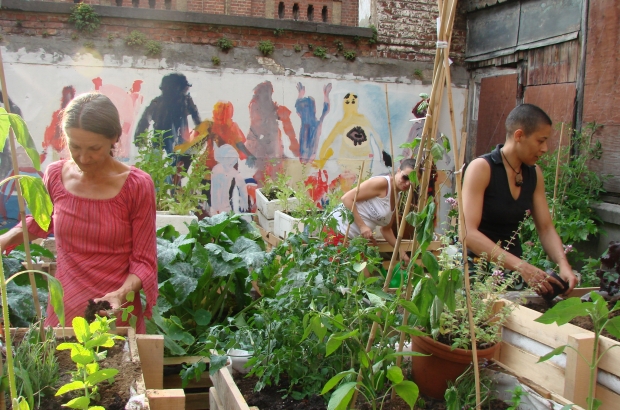- Daily & Weekly newsletters
- Buy & download The Bulletin
- Comment on our articles
Brussels urban farmers call for help amid catastrophic weather
Belgium is not exactly renowned for fine weather, but the exceptionally wet climate for most of the past year has made life difficult for urban farmers, the Brussels Federation of Urban Agriculture Professionals has warned.
According to Belgium’s Royal Meteorological Institute (IRM), since October 2023, there has been above average rainfall in Belgium every month.
The wet weather is slowing down plant development, causing a significant delay in the harvest. Crops are also destroyed by the moisture, which suffocates the soil and encourages the spread of slugs and diseases.
All this means that in Brussels and the surrounding area, there has been about a 40% drop in food production. But the damage is even greater in some sub-sectors such as beekeeping (50% to 75% losses) or tea-growing (up to 60% less tea produced).
The urban agriculture sector has warned this will lead to higher prices and a reduction in product diversity and quality.
“In addition to the loss of motivation, farmers are also worried about their future,” said FedeAU. “If they are to have the strength to continue producing healthy, high-quality food in future, the sector needs support.”
The federation wants politicians to release “simplified and permanent” financial support for diversified urban farms and to take “more ambitious” measures to promote biodiversity and combat climate change.
It also calls on citizens to support urban agriculture in Brussels, which in 2022 produced more than 470 tonnes of food. In the Brussels region there are some 40 successful projects, employing about 140 people - the equivalent of about 90 full-time jobs.
One of these is a three-hectare agricultural plot known as ‘Graines de Paysans’ in Anderlecht, where all kinds of vegetables and herbs grow.
“We work with optimised organic market gardening on small areas. Here, for example, we have just transplanted leeks that we will harvest in winter,” said Guillaume Goor, coordinator of this urban agriculture project on the edge of the city.
Although the fine weather has returned, the start of the season has been complicated for the plantation workers, Goor told RTBF.
"It has never rained so much," he said. "The work was extremely hard, especially for the morale of the troops. We lost a lot of time as everything fell behind schedule, probably two or three months behind schedule, because it was never warm enough. Slugs ravaged our crops. We lost all our squash twice.”
FedeAU said support and financial backing is particularly essential, given that the average urban farmer in Brussels earns a median gross salary of just €1,200 per month. This is €500 less than the sum recommended by the joint committee for agricultural and horticultural work and €750, some 40% less, than the Brussels minimum wage.
“We are calling for the introduction of a structural funding system to support urban agriculture,” said Gaëtane Charlier, coordinator of the federation, that hopes the future Brussels government will take this demand into account.
"This must be automatic for farmers and include measures in the event of agricultural disasters or climatic disasters, as we have experienced in recent months.
"Today, urban agriculture is funded on an ad hoc basis via calls for projects. We need to put in place sufficiently well-funded structural aid similar to what we see in the rest of Europe via the Common Agricultural Policy."



















